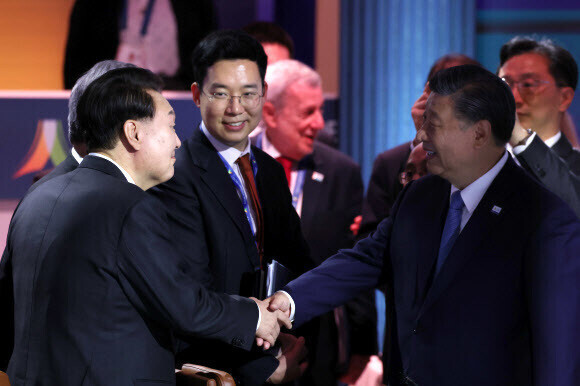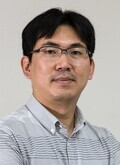hankyoreh
Links to other country sites 다른 나라 사이트 링크
[Column] Bitter aftertaste left by the S. Korea-China summit that never happened


By Gil Yun-hyung, international news editor
“So, is the South Korea-China summit going down, or what?”
Nov. 17, around 3:50 pm. Deadlines are creeping up, and things are getting hectic. My phone buzzes with a text from a Japanese reporter I chat with from time to time. He’s wondering whether or not South Korean President Yoon Suk-yeol is going to hold a summit with Chinese President Xi Jinping.
“Not sure. What do you think?” I’d like to know the same thing. San Francisco. Four hours earlier, during a press briefing for the Asia-Pacific Economic Cooperation (APEC) summit, a ranking staff member of Korea’s presidential office told reporters, “I can’t say for sure, but we’re currently holding discussions,” adding, that the two leaders’ “schedules are chock full right now” when I tried to get more answers.
Yet the South Korea-China summit never happened. When reporters kept pressing Kim Eun-hye, the senior presidential press secretary, about the possible summit, she sidestepped, saying, “There will surely be a time when things come together, and we’ll let you know,” before boarding her flight to San Francisco.
The aforementioned ranking member of the presidential office knows better than anyone just how dire it was for Yoon and Xi to sit down and discuss pressing matters concerning their respective nations — even briefly — and was probably jittering with nerves until the very last moment. I will therefore try to keep this brief. Yet I’d like to stress that South Korea’s diplomatic situation is growing increasingly precarious.
The diplomatic strategy of Yoon for the past year and a half can be summarized as “Anything but Moon.” Since Moon wrecked relations with Japan, Yoon seems to have opted for “humiliation diplomacy,” where Seoul is willing to lose all face to recover relations with Tokyo.
Moon’s approach to China was often referred to as the “Three Noes”: no additional Terminal High Altitude Area Defense (THAAD) deployments in South Korea, no participation from Seoul in a US-led missile defense network, and no involvement in a trilateral military alliance with the US and Japan. The Yoon administration views this arrangement as restrictive and forfeiting South Korea’s sovereignty, and seems bent on nullifying it. The finishing touch was placed this past August at Camp David. The three documents that surfaced at this meeting were the first step towards forming a de facto trilateral military alliance involving South Korea, the US and Japan.
Yet two debates emerged while the Yoon administration was obsessing over erasing its predecessor this past March and April: decoupling and de-risking. Decoupling involves cutting ties with China in response to Beijing's campaigns of aggression in the South China Sea and the East China Sea (Taiwan) and its economic bullying. De-risking proponents assert that maintaining hostile relations with the world’s second-largest economy is infeasible.
Ursula von der Leyen, the president of the European Commission, introduced the idea of de-risking in a speech on EU-China relations this past March. Washington warmed to the approach, and after many bumps in the road, Xi met with US President Joe Biden on Nov. 15 in San Francisco. The two leaders agreed to stabilize relations, despite several issues on which Washington and Beijing clash.
Just two years ago, Australia was leading efforts to contain China through security partnerships like AUKUS and the Quadrilateral Security Dialogue. Sensing a change in the winds, Australia has abruptly adjusted its tune. Australian Prime Minister Anthony Albanese met with Xi in Beijing on Nov. 6, just before the APEC summit. Albanese extended an olive branch by saying, “China is our most important trading partner.”
Japanese Prime Minister Fumio Kishida met with Xi for a whole 65 minutes on Friday to discuss Japan-China relations. Despite a hectic schedule, Xi met with the leaders of Brunei, Fiji, Peru and Mexico on top of meetings with the US (four hours) and Japan (65 minutes) during his time in San Francisco. This sends a clear message to Seoul: Talks with Washington and Tokyo take priority. This leaves a bitter aftertaste.
All this begs the question: Have Seoul’s ties with Washington and Tokyo really grown more robust? Yoon’s concessions to Japan in March have already run aground at home. Since forced labor victims have rejected the Yoon administration’s roundabout compensation offer and courts refusing to accept the deposit of funds, the liquidation of assets belonging to Japanese firms tied up in Korea seems inevitable.
If that happens, will Japan still present a friendly face to the Yoon administration? There’s no telling what the US presidential election will bring in November 2024, and the nuclear powers of Moscow and Pyongyang are banding together against Seoul.
The US has extended an olive branch to China so that competition doesn’t erode into conflict, and Japan has appealed for a relationship of mutual benefit. It is therefore likely that China has dismissed South Korea as irrelevant in the broader discussion. Even if Yoon had managed to secure some of the busy Xi’s time, what could he have said? A person’s words come from his philosophy, and this philosophy creates ripples in the mind of the person he addresses. This may be a tall order for Yoon, but I’d like to see diplomacy based on a flexible but firm philosophy that can pacify an angry Xi.
Please direct questions or comments to [english@hani.co.kr]

Editorial・opinion
![[Column] Is Korean democracy really regressing? [Column] Is Korean democracy really regressing?](https://flexible.img.hani.co.kr/flexible/normal/500/300/imgdb/original/2024/0705/2917201664129137.jpg) [Column] Is Korean democracy really regressing?
[Column] Is Korean democracy really regressing?![[Column] How tragedy pervades weak links in Korean labor [Column] How tragedy pervades weak links in Korean labor](https://flexible.img.hani.co.kr/flexible/normal/500/300/imgdb/original/2024/0703/8717199957128458.jpg) [Column] How tragedy pervades weak links in Korean labor
[Column] How tragedy pervades weak links in Korean labor- [Column] How opposing war became a far-right policy
- [Editorial] Korea needs to adjust diplomatic course in preparation for a Trump comeback
- [Editorial] Silence won’t save Yoon
- [Column] The miscalculations that started the Korean War mustn’t be repeated
- [Correspondent’s column] China-Europe relations tested once more by EV war
- [Correspondent’s column] Who really created the new ‘axis of evil’?
- [Editorial] Exploiting foreign domestic workers won’t solve Korea’s birth rate problem
- [Column] Kim and Putin’s new world order
Most viewed articles
- 1Real-life heroes of “A Taxi Driver” pass away without having reunited
- 2Former bodyguard’s dark tale of marriage to Samsung royalty
- 310 days of torture: Korean mental patient’s restraints only removed after death
- 4Koreans are getting taller, but half of Korean men are now considered obese
- 5[Column] How tragedy pervades weak links in Korean labor
- 6[Column] Is Korean democracy really regressing?
- 7[Interview] The untold story behind South Korea’s national anthem
- 8[Column] How opposing war became a far-right policy
- 9Beleaguered economy could stymie Japan’s efforts to buoy the yen
- 10GNP calls for investigation into ‘The Crucible’ author